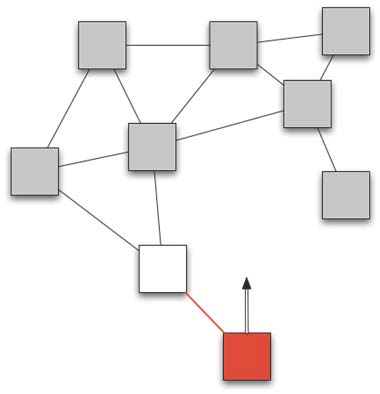
Development and utilisation of methods of context prediction for the optimisation of data generation in wireless sensor networks
Computer Science / Electrical Engineering: Algorithms, Optimisation, Sensor Networks
The aim of the project is to develop new methods for context prediction in wireless sensor networks (WSN) and to utilise these for dynamic adaptation and optimisation of network behaviour. Wireless Sensor Networks provide the infrastructure for communication and measurement in environments where installing network and measurement hardware would be infeasible because of financial, local, and technical restrictions. Methods for prediction of time series are applied, for instance, in predicting financial time series or for computing weather forecasts. Current approaches for prediction in WSNs estimate environment parameters to verify or correct measurement values. We apply methods of prediction to optimise parameters of the network. The goal of the project SenseCast is to determine ways to anticipate critical situations in WSNs by applying methods of prediction and to dynamically optimise network properties and parameters accordingly. Thus, properties, such as reduced energy consumption and decreased latency, can be guaranteed. The focus of the project is to improve the quality of the prediction by decreasing the number of erros in the input time series, by employing collaborative strategies for prediction, and by optimisation of methods for context prognosis, as well as to utilise prediction strategies for adaptation of network parameters for optimisation of network behaviour in WSNs.
The quality of methods for context prediction depends on the probability of errors in context time series recorded from sensor input. Especially with low-cost sensor hardware, the number of measurment errors is very high and prediction can be improved considerably by applying strategies for increasing robustness, such as adaptation of the search space for a given scenario or employing redundancy of sensory data for detecting a context. However, trade-offs have to be observed, such as increased energy consumption or production cost when using redundancy.
Types of context that are spatially dependent are important for many applications. For such types of context, neighboring nodes of a sensor network are likely to observe similar context time series. Collaborating nodes can therefore improve both classification and prediction of context. For mobile nodes, collaboration strategies depend not only on the nodes' present location or neighborhood but also on past or future locations. In order to formulate such strategies a wider notion of spatio-temporal neighborhood has to be employed.
Context prediction can be understood as a search problem. An algorithm has to search a given space of possible context time series to identify the time series that best approximates the actual context series to be recorded. Algorithms differ according to achievable quality of prediction, restrictions on input formats, and complexity. As part of the project SenseCast, these methods are analysed and optimised with respect to the criteria of resource consumption and quality for our scenarios.
The usefulness of prediction is evaluated with respect to several layers of network protocols. Ther are many suitable control parameters that would benefit from prediction, for instance: on the physical layer, transmission power can be adjusted depending on predicted packet error rate; on the MAC layer, a Backoff Algorithm can benefit from a correct prediction of the number of competing nodes; and on the routing layer, a method for generating cluster trees can be optimised if node mobility can be predicted.
| Name | Phone | Room | |
|---|---|---|---|
| Prof. Dr.-Ing. Michael Beigl | michael[[at]]teco.edu | +49-721-608417-00 | |
| Dr. Stephan Sigg | +49-531-3913249 | ||
| Dr. Hedda Schmidtke |
Vacancies of TU Braunschweig
Career Service' Job Exchange
Merchandising
Term Dates
Courses
Degree Programmes
Information for Freshman
TUCard
Technische Universität Braunschweig
Universitätsplatz 2
38106 Braunschweig
P. O. Box: 38092 Braunschweig
GERMANY
Phone: +49 (0) 531 391-0